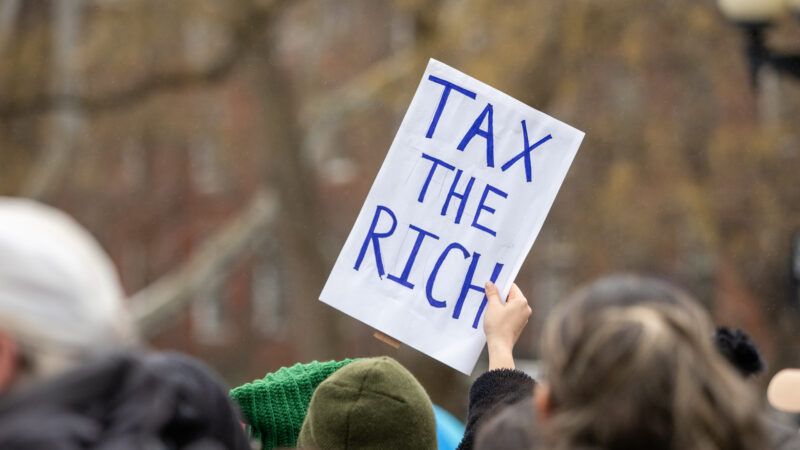It's Time for a Flat Tax
America’s tax system is already highly progressive. A simpler, flatter structure would be fairer, raise more revenue, and fuel economic growth.

Despite what many believe, the United States is a place where the highest earners—depending on their state of residence—can face Sweden-like levels of taxation, while the lowest earners have effectively no tax liability at all. Income tax brackets have been ratcheting more progressive over time, as successive administrations have lowered bottom rates while keeping top rates more or less the same. A case could be made for the poor to pay more and the rich to pay less.
Obviously, that is going to go down like a lead balloon. Liberals will squeal if the rich are permitted to pay less, and everyone will squeal if the poor are made to pay more. For the first time since Steve Forbes in the 1990s, there are real discussions about flattening the tax code. In the tax law passed during Ronald Reagan's second term, there were only two tax brackets: one at 16 percent and one at 28 percent—the flattest tax rates have been since the income tax was instituted in 1913. It is worth pointing out that the economy grew strongly in the ensuing years, and tax revenue actually rose as the tax code was greatly simplified and loophole deductions and credits were phased out.
President Donald Trump's Treasury Secretary Scott Bessent has not yet turned his attention to taxes—aside from saying that the 2017 Tax Cuts and Jobs Act will be extended—but it seems a big flattening and simplification is coming if the TCJA is any precedent.
The bottom two rates in the current tax brackets are 10 percent and 12 percent, with the 12 percent bracket phasing out at about $90,000 for married taxpayers filing jointly. Much of that liability disappears with a large standard deduction, generous child tax credits, and earned income tax credits. The flaw in this system is that people think they pay taxes, when most of it is returned in the form of a refund. The bottom 50 percent of taxpayers have an effective tax rate of 3.3 percent, while the effective tax rate for high-income taxpayers has been estimated at between 25 percent and 31 percent.
It should be pointed out that the bottom tax rate is much lower in the U.S. than in other developed countries. In Sweden, the bottom tax rate, applied to the lowest-income taxpayers, is 32 percent. In Britain, it is 20 percent. This is about having skin in the game—if you're not financially contributing to something, whether it is an office coffee pot or a homeowners association, you're likely to be careless with that responsibility.
Even a flat tax is progressive. If I make 10 times as much money as you, I pay 10 times as much in tax. However, under the current system, if I make 10 times as much money as you, I pay 50 times as much in tax—and yet the rich are still excoriated for not paying their "fair share." A good example of a democracy in decline is when the 40 percent of Americans who don't pay an income tax vote for higher taxes on those who do.
A flatter tax code, without deductions and credits, will raise more revenue over time. Most of the tax cut debate is framed around the deficit. The thinking is that if we cut taxes, the deficit will grow. While the Department of Government Efficiency (DOGE) is ostensibly cutting spending, with the goal of balancing the budget, a flattening of the tax code will bring us closer to that goal. Throughout history, with all the different tax brackets we have had over time, the government's take has averaged around 20 percent of gross domestic product. When taxes are high, people find a way to avoid them. When taxes are low, people don't mind paying them. If raising taxes doesn't lead to more revenue, then we shouldn't do it—it is just a paperwork drill and a hassle for everyone.
The simplest and fairest tax code of all is a consumption tax, but it would be very foolish to introduce a consumption tax without first repealing the 16th Amendment. Otherwise, we will have two parallel systems of taxation, and the government will take up to 40 percent of GDP, like in much of Western Europe. We are stuck with the income tax—absent radical political change—so we should try to make it as fair as possible.
It's doubtful that we could ever achieve a completely flat tax—there will always be some progressivity. But flattening it a bit would go a long way toward fairness and economic growth.


Show Comments (148)